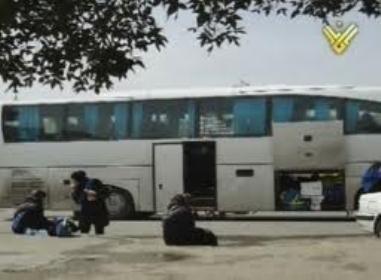Abu Ibrahim Lays Out Demands as 2 Pilgrims Praise Good Living Conditions

The kidnapper of Lebanese pilgrims in Syria said he will not release the men unless the Syrian government sets free two prominent opposition figures and Lebanon frees all Syrian activists in government custody.
Amar al-Dadikhi of the North Storm brigade, also known as Abu Ibrahim, claims to have 1,300 armed fighters and a network of cross-border contacts, said the New York Times.
His control of the border crossing that leads to Aleppo, Syria’s largest city, makes him a power broker by default, it said.
The 11 pilgrims were kidnapped in May as they crossed to Syria following their return from a pilgrimage in Iran. Two of them were released in August and September but nine still remain in custody.
“Abu Ibrahim has his requests,” the newspaper quoted Col. Abdul Jabbar al-Okaidia, a former Syrian military officer and one of the Free Syrian Army commanders in the Aleppo region, as saying. “If they are taken care of, he will free the Lebanese.”
The two opposition figures whose release he has sought by name — Tal al-Mallohi and Lt. Col. Hussein Harmoush — have not been heard from during the hostages’ detention. Many activists fear that they are dead, said the New York Times.
“Mallohi, a teenage blogger at the time of her arrest, had no direct participation in the uprising. Her blog, which included poetry she wrote, expressed support for Palestinians or a better life in Syria. She was seized by security officers in late 2009 and jailed, accused of spying,” said the newspaper.
The uprising against President Bashar Assad began in 2011.
As for Harmoush, the first prominent defector from the Syrian Army, “he fled Syria in June 2011 and claimed that the government had ordered the army to fire on civilians,” the newspaper said.
“He disappeared from Turkey in August 2011 and soon appeared on Syrian state television to recant his statements, in what the opposition called a coerced appearance,” it added.
Abu Ibrahim demanded that Lebanon release any anti-Assad activists it had arrested since the uprising began. He said he did not have a count of activists in Lebanese custody, but he suggested that the number could be up to a hundred.
He allowed two journalists from The New York Times to meet with two of the hostages — Ali Abbas, 30, and Ali Tormos, 54 — for about 30 minutes last week.
The interview was held in a former government office at the border crossing from Syria to Kilis, Turkey, the newspaper said. Dadikhi agreed to leave the room while the hostages spoke.
According to the New York Times, the men appeared to be in good health, and told the journalists they and the other hostages had not been harmed.
“As God is my witness: No one has bothered us or hurt us or told us bad words,” Tormos said. He called for the removal of the Assad government.
He and Abbas also praised Abu Ibrahim and described their living conditions in cheerful terms.
Abbas said that they had ample food, medicine and heat, and access to a television.
This is not the first time the hostages claim they are living in good conditions. Several reporters from local TV stations have interviewed the pilgrims in the past.
The interview was held in the border crossing.... So it means they're being held in turkey! Wtf:s



